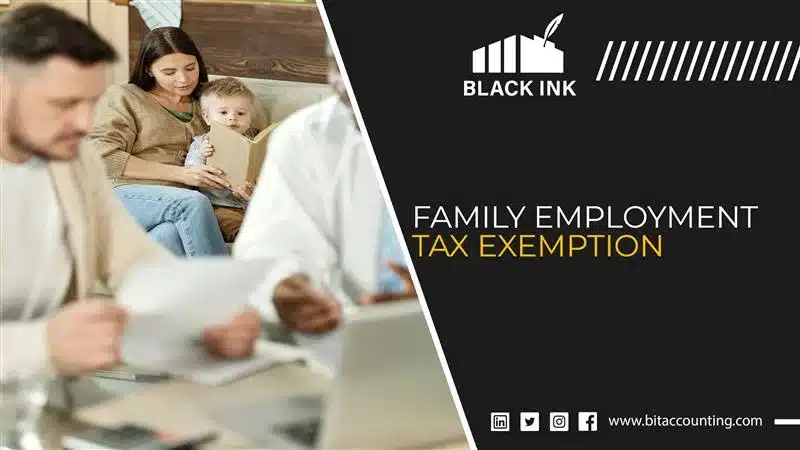
Table of Contents
Family Employment Tax Exemption: How It Can Save Your Money
Running a small business means keeping an eye on every dollar, especially when it comes to taxes. But what if you could legally lower your tax bill by simply hiring the people you trust most—your family?
That’s exactly what the Family Employment Tax Exemption (FETE) offers. It’s a smart tax-saving strategy that lets small business owners and the self-employed pay family members as employees, while trimming down their overall tax load.
From cutting payroll taxes to shifting income to lower tax brackets, this little-known strategy can lead to big savings. And if you’re a sole proprietorship, LLC, or family-run business, it could be just the tool you need to boost your bottom line.
In this guide, we’ll break down what family employment tax exemption is, how it works, who can use it, and how to make the most of it, without getting tangled in IRS tax forms or legal trouble.
Understanding the Family Employment Tax Exemption
The Family Employment Tax Exemption is a way for business owners to legally reduce their taxable income and payroll tax by hiring close family members—like a spouse or child—as employees.
The Legal Side
According to United States law and Internal Revenue Service (IRS) rules, certain taxes like FICA (Federal Insurance Contributions Act) and FUTA (Federal Unemployment Tax Act) don’t apply when specific family members are hired under qualifying business structures.
That means no Social Security taxes or unemployment tax payments in some cases—especially when hiring your children under 18.
Who Can You Hire?
The rules vary depending on who you’re hiring:
- Children under 18: If you own a sole proprietorship or partnership (with both spouses as partners), their wages are exempt from FICA and FUTA.
- Spouses: Wages are exempt from FUTA, but not FICA.
- Parents or other relatives: Different rules apply—consult a tax professional or the IRS for specifics.
This tax exemption is perfect for small businesses, family-run shops, and self-employed workers looking to keep more of their hard-earned income.
How Does Family Employment Tax Exemption Work?
Let’s break it down. For FETE to work smoothly, you need the right business structure and a few legal steps in place.
Business Types That Qualify
- Sole Proprietorship: The most common and straightforward setup.
- Partnerships (spouses only): Both partners must be spouses for full benefits.
- LLC taxed as sole proprietorship: This works if you’re the only owner.
- S-Corps and Corporations: You don’t get the same benefits here—payroll tax rules still apply.
What About the Taxes?
When your child under 18 works for your sole proprietorship:
- No FICA (Social Security and Medicare taxes)
- No FUTA (federal unemployment tax)
- Their wages are still deductible as a business expense
This means:
- Less taxable income for you
- No payroll tax payments for certain family members
- More money stays in the family economy
Tax Benefits of Hiring Family Members
Let’s dig into the real money-saving benefits. These aren’t just small perks—they can make a serious dent in your yearly tax bill.
Payroll Tax Savings
Here’s how much you could save:
Imagine paying your 16-year-old child $12,000 a year to help with admin tasks. Under FETE:
- No FICA tax (~15.3%) = Saves ~$1,836
- No FUTA tax (~6%) = Saves ~$720
- Total tax savings = Over $2,500/year
You get a full tax deduction, and your child gets earned income without paying federal income tax (as long as it’s under the standard deduction threshold).

Income Shifting to Lower Tax Brackets
This is where it gets fun. Let’s say you’re in the 24% tax bracket, but your child earns $12,000—which is under the taxable limit.
That means:
- You reduce your own income by $12,000 (lowering your tax rate)
- Your child pays $0 in federal income tax
- Your family saves $2,880 or more, depending on your bracket
It’s a legal tax break that uses family economics to your advantage.
Retirement and Benefits Planning
Hiring family also opens the door to other financial perks:
- Roth IRA: You can contribute up to $7,000 of your child’s wages into a Roth IRA, setting them up for long-term investment growth.
- Health Insurance: You can cover your spouse or child through the business and deduct it as a business expense, reducing your overall insurance costs.
- Employee Benefits: You can offer family the same benefits as other employees—everything from health care to reimbursement plans.
How to Implement Family Employment Tax Exemption in Your Business
Ready to get started? Here’s how to do it legally, smartly, and safely.
Steps to Legally Hire a Family Member
- Define a Real Job: Give them a real role (filing, customer service, bookkeeping, etc.) with tasks they can actually do.
- Pay a Fair Wage: Use market rates for the job—not too high or low.
- Set Up Payroll: Use proper IRS tax forms (like W-2) and track every paycheck.
- Keep Records: Maintain timesheets, job descriptions, and payment receipts—this protects you in case of an audit.
- Withhold Taxes If Needed: Only withhold if your family member doesn’t qualify for an exemption.
Common Mistakes to Avoid
Avoid these to stay in line with United States federal policy:
- Overpaying your child or spouse—this could trigger IRS penalties
- No job records—if they can’t prove they worked, the deduction could be denied
- Mixing business and personal finances—always pay from your business account
Hiring family is legal under tax law and economic policy, but only when you follow the rules.
Tools and Resources
- Payroll Software: Try tools like Gusto, QuickBooks, or Patriot for easy family payroll management.
- Tax Professionals: A financial adviser, lawyer, or tax expert can help you avoid problems and plan smartly.
- BIT Accounting: Our team at BIT Accounting helps small businesses like yours with tax planning, payroll, and business services—and yes, we help set up FETE too!
Conclusion
The Family Employment Tax Exemption isn’t just some corporate jargon—it’s a real tool that can help you lower taxes, pay your family, and build wealth inside your household.
It benefits your business, boosts your family’s income, and keeps more money in your pocket—all while staying 100% legal under IRS rules and public finance law.
Whether you’re self-employed, run a partnership, or operate a limited liability company, hiring family the right way can lead to big-time savings and future security.
Need help making it happen? BIT Accounting is here to guide you every step of the way.
FAQs
1: Is it legal to hire my child for my business?
Yes! As long as they do real work and are paid fairly, it’s totally allowed under United States law and IRS rules.
2: Can I deduct wages paid to my spouse or child?
Absolutely. Their wages count as a business expense—just keep good records and issue the correct IRS tax forms.
3: Do I have to pay Social Security or Medicare tax on their income?
Not always. Children under 18 working for a sole proprietorship are exempt from FICA taxes.
4: What if I own an S-Corp?
You’ll still need to pay standard payroll taxes. FETE benefits don’t fully apply here.
5: Can my child contribute to a Roth IRA with their income?
Yes! As long as the income is earned from real work, it’s eligible for Roth IRA contributions.
GET FREE QUOTE FOR ALL OF OUR SERVICES
Black Ink will send you a free analysis of your current state and what would be the cost of managing either a separate accounting and bookkeeping services or a complete solution across New York, USA. Do get in touch and we will be happy to consult you with our bookkeeping services in NY, New York, USA.
